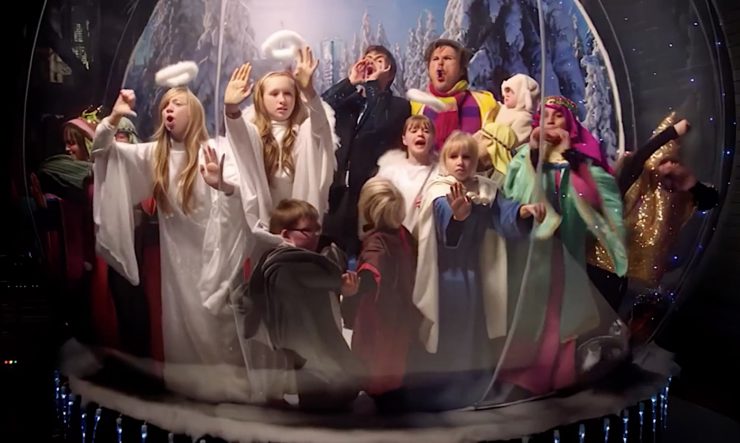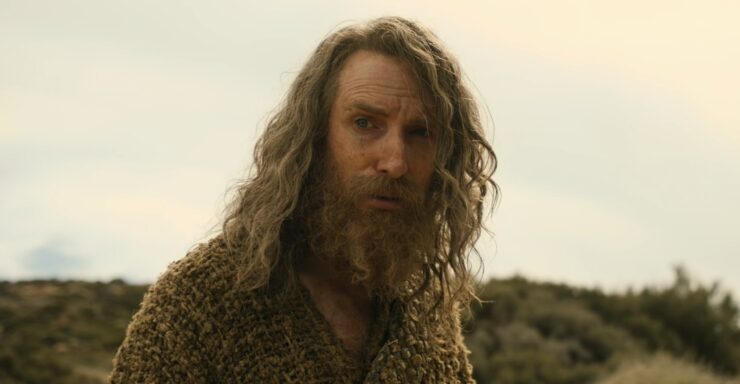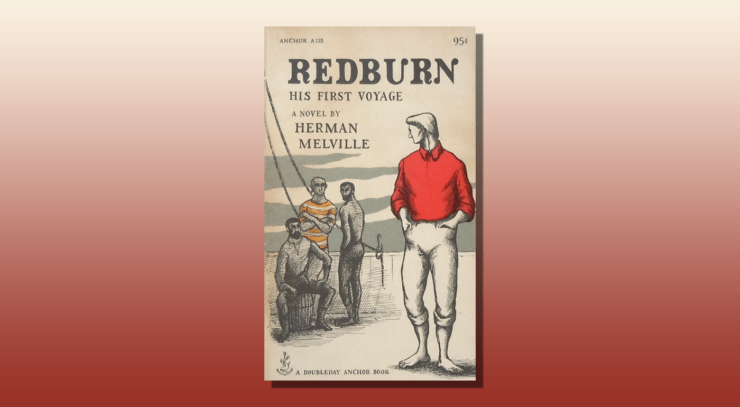Welcome to Close Reads! In this series, Leah Schnelbach and guest authors dig into the tiny, weird moments of pop culture—from books to theme songs to viral internet hits—that have burrowed into our minds. This time out, Alissa Burger celebrates the sheer joy of a holiday film featuring a ragtag group of students, a Christmas song competition, and David Tennant’s evil twin.
One of my very favorite holiday traditions is watching (and rewatching and rewatching) Nativity 2: Danger in the Manger (2012), the second film in a British series that includes Nativity! (2009), Danger in the Manger, Nativity 3: Dude, Where’s My Donkey? (2014), and Nativity Rocks! (2018). I enjoy the others, but Danger in the Manger is where my heart is, for its exuberant silliness, optimism that defies all logic and reasoning, and unapologetic joy.
The Nativity series follows the dreams of a group of students at St. Bernadette’s School in Coventry. In Danger in the Manger, the kids are a bit let down: they were a smash hit with their nativity production the previous Christmas, but after their teacher Mr. Maddens (Martin Freeman) took a job in the United States they’re at a bit of loose ends, left under the tutelage of their ridiculously underqualified and irrepressible classroom assistant Mr. Poppy (Marc Wootton). While teacher after teacher cycles through their classroom, finding the children too unmanageable and rambunctious to stick with, the children and Mr. Poppy set their sights on the “Song for Christmas” competition being held at a castle in Wales, determined to compete and win. Not long before Christmas, Donald Peterson (David Tennant) joins this ragtag group and finds himself swept up in their madcap antics. People are constantly counting Mr. Peterson, Mr. Poppy, and the children of St. Bernadette’s out: Gordon Shakespeare (Jason Watkins) is the conductor of the local Oakmoor Choir, a foil through the first three Nativity films, and tells the children of St. Bernadette’s that they are “poor and thick.”
Donald Peterson’s father (Ian McNeice) disapproves of Donald’s job as a schoolteacher. He also constantly hectors Donald about how much prouder he is of Donald’s twin brother Roderick– also played by David Tennant.That’s right, David Tennant plays his OWN EVIL TWIN. And of course, Roderick’s well-respected St. Cuthberts’ choir is the frontrunner in the “Song for Christmas” competition. Donald is kind and open-hearted, if a bit rumpled and overwhelmed, while Roderick is always firmly in control, with never a hair out of place, hard and occasionally even cruel. This dual role showcases the different emotional and physical sensibilities Tennant brings to these two characters, establishing them as distinct and conflicting.

Both Oakmoor and St. Cuthberts are more exclusive and have stronger financial support than St. Bernadette’s, which inevitably translates into greater respect and opportunities for their pupils, with the St. Bernadette’s students often insulted and dismissed.
Despite Donald’s resistance and repeated attempts to bring some structure to the classroom, he finds himself forced aboard a festive duck boat and bound for Wales, though there are many obstacles and detours along the way, including getting lost when they follow a sign pointing the wrong way (sabotage by Shakespeare), the duck boat running out of gas, the discovery of a stowaway baby, a trip down some whitewater rapids, and helping a dozen children scale a sheer cliff face. Along the way, they pick up a magical donkey (Archie), who encapsulates the significant difference between Donald and Mr. Poppy’s worldviews: where Poppy sees the donkey as heaven-sent, the ideal friend to help them ferry the tired children, Donald points out that borrowing the donkey is actually the theft of someone’s property. The children ascribe to Poppy’s imaginative worldview and the donkey becomes part of their roving band, making quite an impression at the castle when he poos all over the steps, and even joining the St. Bernadette’s choir on stage for their performance. The donkey responds when asked questions, inexplicably meets the group downriver when they disembark from the rafts they’ve taken down the rapids, and finds his way into the castle, so maybe he actually IS magical …
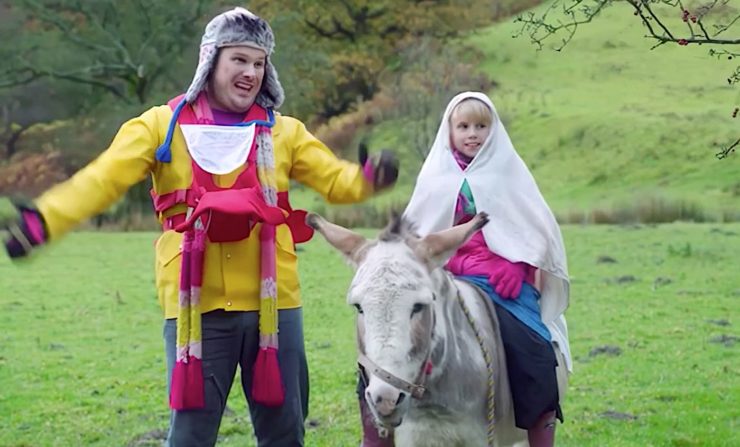
Despite these misadventures, in the end, they arrive at the castle for the “Song for Christmas” competition, which is the heart of the film. In addition to Shakespeare’s Oakmoor choir and Roderick Peterson’s choir from St. Cuthberts, the diverse groups of competitors in the “Song for Christmas” contest present a microcosm of contemporary holiday vibes and music trends. The competition is open to any individual or group under eighteen years old, and the musical traditions presented are diverse and wide-ranging.
First, there are the Christmas Puddings, a group of young girls dressed as—you guessed it—Christmas puddings. Their song is called “Christmas Is for Crackers” and celebrates a wide range of Christmas traditions, from pulling crackers and singing carols to stuffed stockings and mistletoe, celebrating the emotional tenor of Christmas as one of “happiness and all goodwill.” The Christmas Puddings are adorably and unapologetically adolescent, eschewing more adult costumes or performance for tights and big, floppy costumes. Any body positivity this presents, however, is pretty quickly dismissed when they lament that all those Christmas goodies will result in the need for “a slimming pill” and that one of the happy feelings of Christmas comes from “walking off your dinner down a frosty lane.” (In Danger in the Manger, onstage performance scenes are intercut with those of backstage drama; lyrics throughout this close read are drawn from both the film and the soundtrack, which includes full versions of the songs). This catchy tune both gives and takes away, celebrating the concrete and emotional indulgences of the holiday season, while simultaneously reminding listeners that eventually this indulgence must be atoned for and worked off. The girls singing these lyrics seems blissfully unaware of the significance of these lines as they exuberantly dance around, though this carefree attitude is likely performative to at least some degree, given the wealth of cultural messages about size, shape, and femininity with which they have certainly been bombarded at this stage in their lives, as their song uncomfortably balances the simple joys of childhood with more adult, self-critical worries.
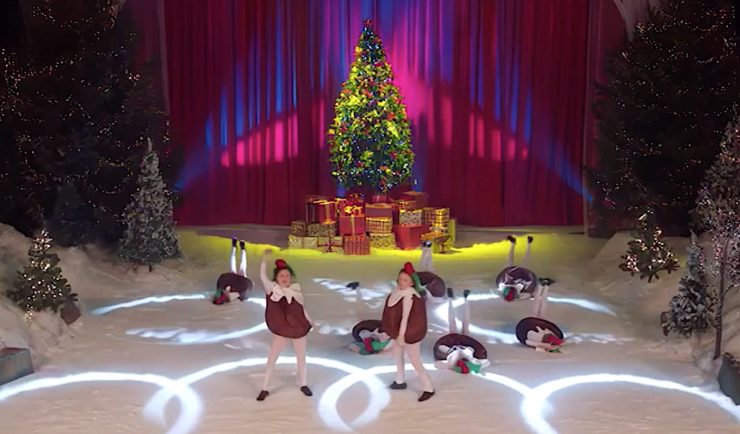
The Christmas Puddings are followed up by Lloyd and the Snow Balls, with “Snow Angel.” Lloyd (Lloyd Ellis Cornish) is presented as a boy band-style dreamboat, with other competitors comparing him repeatedly to Justin Bieber, though there’s also a humorous generational disconnect, as adults mistakenly refer to the pop singer as “Justin Beaver” and “Jason Bieber.” Lloyd tosses his hair as girls in the audience shriek and swoon, and with his song, professes his romantic love to a girl dressed in a sparkly dress, suspended from the ceiling, and bestowing glittery snow on the singers below. His lyrics extol her idealized femininity with winter descriptors about how she’s “pure as the driven snow,” with “snow white hips” and “snowflake wings.” The group has some complicated, symmetrical choreography where they fall to the fake snow-covered stage and make synchronized snow angels, though it’s unclear how the auditorium audience will see this feat of coordination (just five boys flailing about?).
Next is a group called An Irish Christmas with their song “Spirit of the Trees.” Their performance is a Riverdance-esque Irish step dance routine, with the girls dancing in hoop-skirted Christmas tree dresses. The traditional and recognizable nature of this style of dancing evokes other types of holiday-specific performances, like the profusion of Nutcracker ballets during the Christmas season, while simultaneously honoring and absorbing the complexities of national identity and traditions. The Irish Christmas performers’ dancing is precise and energetic, with the shimmering green of their dresses providing a striking visual contrast to the muted artificial trees of the set dressing. Their performance is simultaneously traditional and innovative, with music that alternates between haunting and rhythmically driven.
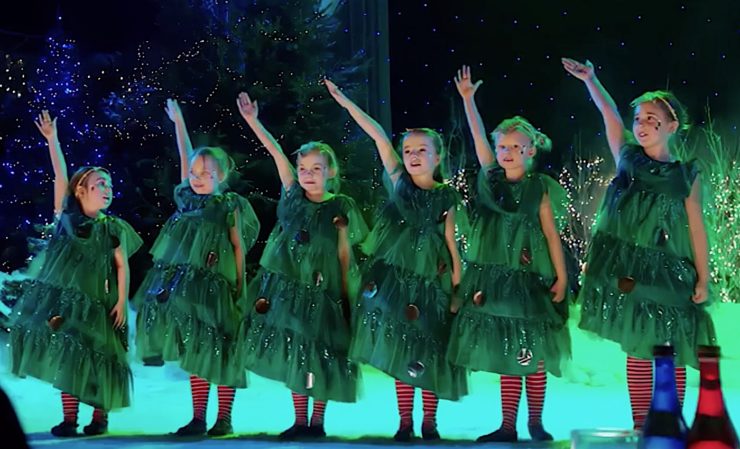
Just as the Irish Christmas dancers draw on both traditional and contemporary influences, the next group of performers also synthesize different styles, in this case hip-hop and ballet, with a song called “Christmas Fairies.” The two styles are shown as complementary as their dancers engage with and respond to one another, though they are also explicitly contrasted in the lyrics themselves, as the lead singer (Ellie Egan-Williams) admonishes that fairies don’t hang out with “boys in the ‘hood.” The interaction between the dancers and the fairy ballerinas is charged and potentially combative, as the singers demand that the fairies grant wishes and “let me ride your fairy wings.” The fairies hold their pursuers at a distance, maintaining a delicate balance of synthesized styles and thematic tension.
Next up are Shane (Shane Keogh Grenade) and the Calendar Girls, with an elaborate Advent calendar set. While the Christmas Puddings celebrated (and lamented) the bounty of Christmas foods, Shane is all about the presents as he sings “Counting Down to Christmas.” As he tells the audience, “You can keep your peace on Earth … All I want is Christmas stuff,” before singing his way through a long wish list of swag, including designer fashions, diamonds, and a car. Shane unapologetically epitomizes the acquisitional madness of the season, from the stampedes of Black Friday shopping to ads for luxury cars and expensive jewelry that dominate the airwaves in the weeks leading up to the holiday. His obsession with getting “something with some worth” dismisses the emotional or spiritual significance of Christmas, boiling it down to piles of pricey gifts, though this expression of greed is at least refreshingly forthright and unfiltered.

Roderick Peterson’s choir from St. Cuthberts is clearly the most professional of the competing groups, performing a classically-styled composition called “Peace and Joy.” It is lyrically complex, with clearly differentiated parts that contrast, complement, and elevate one another, with crisp diction and powerful delivery. Their performance is of the highest quality, which is credited to Roderick’s exacting standards and relentless drive for perfection. The showpiece of their performance, however, is a solo that Roderick stole from Mr. Shakespeare’s song while eavesdropping on their soundcheck, folding it almost seamlessly into his own choir’s performance and executing it at a higher level than Shakespeare’s students could, meaning that if Shakespeare’s group performs the same thing, they’ll not only be suspected of stealing Roderick’s song but will deliver an inferior performance that will be directly compared with that of Roderick’s soloist. In addition to stealing Mr. Shakespeare’s song, Roderick and his choir also steal the BABY from Donald and the St. Bernadette’s group, using the child as a prop in their resplendent final verse. Roderick’s choir is great, though the lengths he is willing to go to in order to achieve that greatness are evident, as he tells his boys “We do not cheat. We succeed.” Roderick is the antithesis of Donald, with their priorities, values, and the way they treat the children in their care directly contrasted.
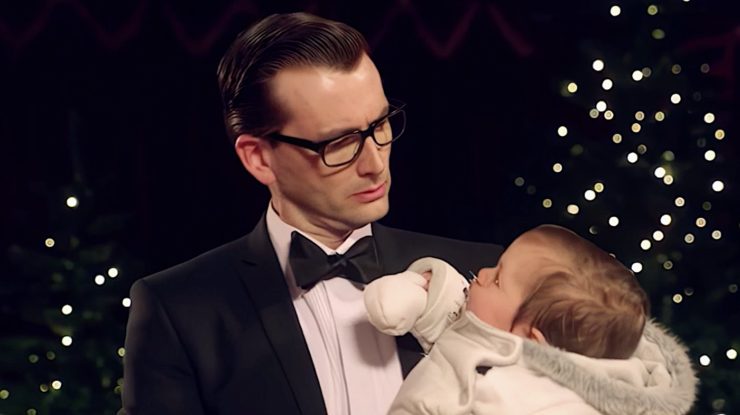
Mr. Shakespeare and the Oakmoor choir actually don’t even get to compete in the “Song for Christmas” competition, sabotaged by Roderick’s theft of Shakespeare’s song. The piece they have prepared for the contest is titled “A Dickens Christmas,” a musical theatre-influenced song that is introduced by ominously clanging bells and features the children in a state of sensationalized, performative poverty, declaring that “Christmas ain’t for paupers.” This echoes the way Shakespeare engages with class and privilege throughout the film, like when he explicitly points out the poverty of the St. Bernadette’s pupils and in an in-credits scene, coaches his pupils to deliver their lines “like a working class person,” praising their exaggerated delivery as “so accurate … so authentic, that.” Like Roderick, Shakespeare is driven to succeed, no matter the cost and when he loses Eleanor, one of the children in his choir, during a bathroom stop, he is horrified but forges on with preparing for the competition without another thought. (Eleanor is found and adopted by the St. Bernadette’s group, having the adventure of a lifetime, so no worries there, but Shakespeare doesn’t know that). While “A Dickens Christmas” emphasizes the limitations of an idealized holiday of warmth and plenty, the song stops short of engaging social awareness or change, however, instead making a spectacle of suffering and lacking any sense of hope, mired in the downtrodden hopelessness featured in the “Christmas Present” section of Dickens’ A Christmas Carol.
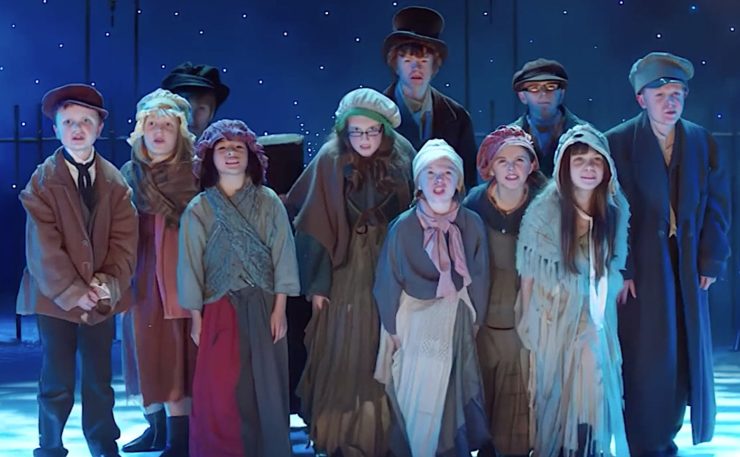
After all their adventures, St. Bernadette’s is disqualified for arriving late. But when Oakmoor Choir finds themselves unable to perform their song due to Roderick’s theft, Shakespeare pushes Mr. Peterson, Mr. Poppy, and the St. Bernadette’s group to go on in their place. While many of the other groups had elaborate sets and effects, the St. Bernadette’s group is pushed on stage in a giant inflatable snow globe (where they have been trapped by Roderick), performing their first song, “Yes We Can” from within this sphere. “Yes We Can” is a direct reflection on the adventure that brought them from St. Bernadette’s to the castle, celebrating that “yes we can climb the mountain” and persevere through challenges to achieve their goals. While the children of St. Bernadette’s are less talented than some of their competitors, their group features a wide range of soloists as many of the children get a line of their own, though those individual performances are absorbed by the collective joy of the group singing together. While the St. Bernadette’s performance lacks much of the flash and polish of the earlier groups, their joy and enthusiasm are infectious, as a version of the wave breaks out along all three tiers of the auditorium and audience members begin cheering and dancing along (even Roderick’s buttoned-up and beaten-down choir boys!).
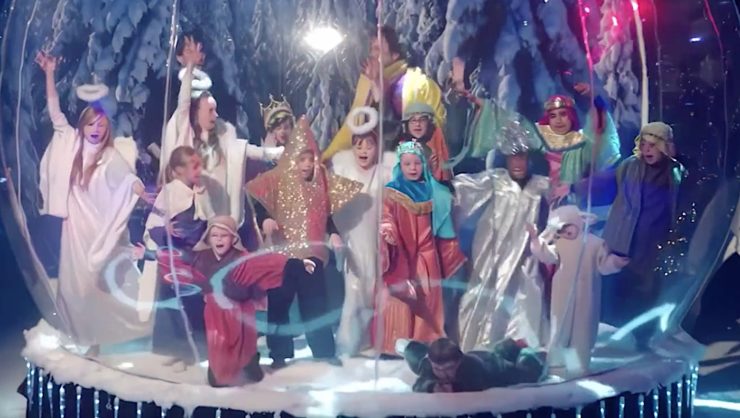
Following “Yes We Can,” the connection between audience and the St. Bernadette’s group onstage is developed even further, as their classmates in the audience begin to sing directly to their peers, leading into the song they actually wrote and prepared for the contest, “Born in the Hay,” which results in the St. Bernadette’s group emerging from their snow globe and dancing in exuberant and uncoordinated glory, jumping about and singing this second song at the top of their lungs. Each child dances as his or her fancy and passion moves them, including Jesse’s (Jesse Donohoe) spirited attempt at break dancing that’s really just a boy rolling around (adorably) on the floor. Skill-wise, they are nowhere near the level of Roderick’s highly polished choir. But their enthusiasm and joy are undeniable, and they leave the stage to thunderous applause.
Reality comes quickly crashing back in when they go backstage, where Donald is confronted by Roderick and their father. When Roderick tells Donald that he’s still going to win the contest, Donald acknowledges that this is the likely outcome, but is unapologetic, telling them that “we went out there and had fun … [and] having fun is pretty bloomin’ important” before telling off both his father and his brother. The St. Bernadette’s group is booted out of the castle, Mr. Peterson’s pregnant wife Sarah (Joanna Page) gives birth in a barn to two (horrifically enormous) twin boys, and excitement over the boys’ birth patches up all the Peterson family’s estrangements. And back in the castle, the St. Bernadette’s group wins a “Song For Christmas,” though they do so credited as Oakmoor, an accolade Mr. Shakespeare is glad to accept as his own, shushing an objecting pupil by telling him “shut up, we won!”
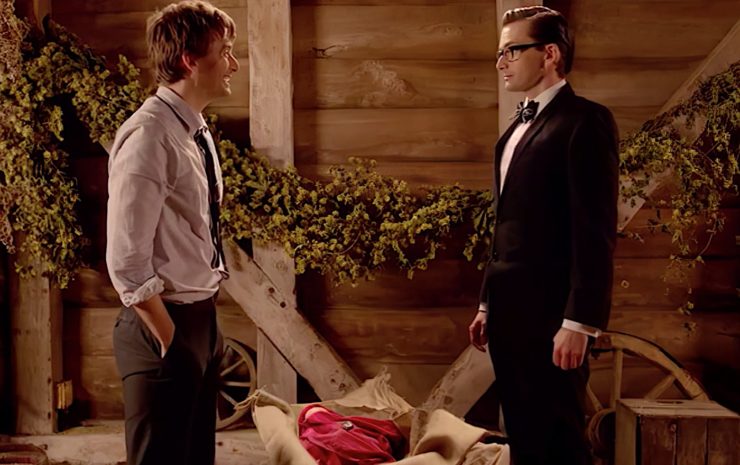
So who are the real winners? It’s all a bit complicated, really. The panel of judges includes an opera singer, a stage actor, a record company executive, and a radio host, highlighting the combination of the artistic and commercial driving forces of the music industry. The competition is hosted by a popular singer, Angel Matthews (Jessica Hynes), whose commentary highlights the prepackaged and inherently unfair structure of the contest itself. She favors Roderick, giving him preferential treatment when his choir arrives at the castle, letting him spy on the other groups’ sound checks to gain a competitive advantage, and throwing shade at the various groups in her introductions, calling Lloyd’s music “not my cup of tea” and introducing the St. Cuthbert’s choir with blatant favoritism as “in my opinion, the best choir on the stage tonight.”
While eligibility and the panel of judges are clearly defined, the criteria for the actual judging is not. So what determines the winner? Each of the groups featured brings a unique sensibility and innovation to the competition, highlighting different elements of holiday celebrations and Christmas musical traditions. If the deciding factor in judging is proficiency and professionalism, St. Cuthbert’s is objectively the “best,” even if that excellence is ill-gotten. But if the deciding factor is enthusiasm and joy, it’s St. Bernadette’s all the way. Of course, in the real world, competitions are rarely decided by joy, which is what makes Danger in the Manger so magical. Even when the children of St. Bernadette’s win, however, they don’t “really” win because they win as Oakmoor, and they don’t actually care in the end whether they won or not, which calls the whole concept and value of winning into question. The children of St. Bernadette’s overcame a wide range of obstacles, persevered, sang, danced, and had a whole heck of a lot of fun, which makes them winners, regardless of the outcome of the contest itself.
The holidays can be stressful and overwhelming, The blatant consumerism can be demoralizing and draining (both financially and emotionally), while family tension and trauma often add extra stress to the season. The days are short and the to-do lists are long. We could all use more unapologetic silliness, more joy, and more of David Tennant playing his own evil twin brother.










